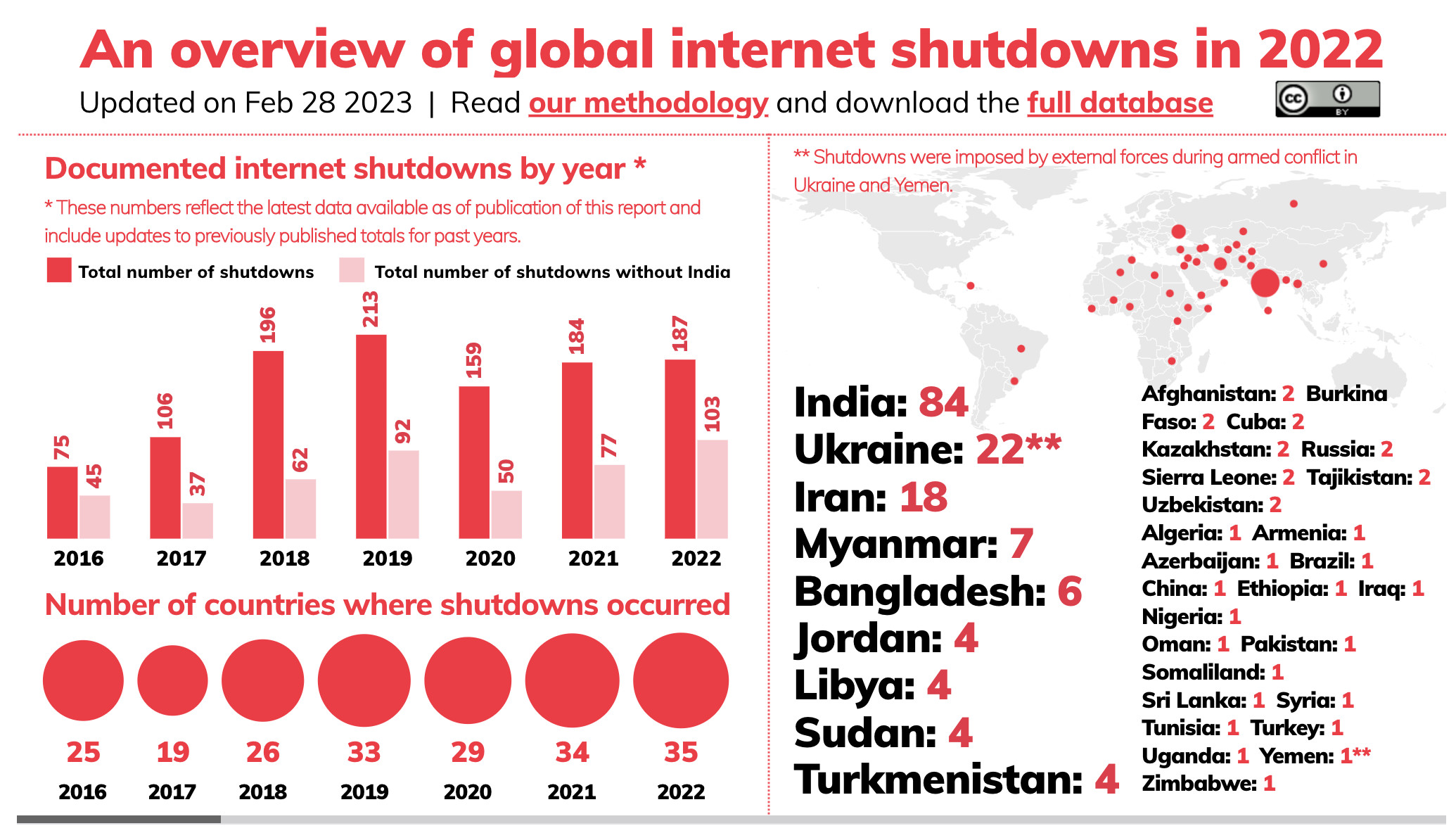Ahmedabad
(Head Office)Address : 506, 3rd EYE THREE (III), Opp. Induben Khakhrawala, Girish Cold Drink Cross Road, CG Road, Navrangpura, Ahmedabad, 380009.
Mobile : 8469231587 / 9586028957
Telephone : 079-40098991
E-mail: dics.upsc@gmail.com

Internet shutdown
News: Over the past few years, the Indian government has increasingly been trying to control law and order by shutting access to the Internet. Between 2016 and 2022, 60% of Internet shutdowns across the world took place in India.
Background:
• According to a report by Access Now and the #KeepItOn coalition, India enforced as many as 84 Internet shutdowns in 2022 and was on top of the list for the fifth year in a row.
What is Internet shutdown?
• An Internet shutdown is an intentional disruption of Internet-based communications, rendering them inaccessible or effectively unavailable, for a specific population, location, or mode of access, often to exert control over the flow of information.
• Internet shutdowns can take various forms, such as blocking specific websites, applications or services, throttling the speed or bandwidth of the Internet, or cutting off the power or infrastructure that supports the Internet.
What are the laws and regulations governing Internet shutdowns in India?
There are two main laws and regulations governing Internet shutdowns in India, namely.
• Section 144 of the Code of Criminal Procedure, 1973 (CrPC), which empowers the District Magistrate or Executive Magistrate to issue orders to prevent any nuisance or disturbance of public tranquillity, such as by prohibiting the assembly of more than four people or restricting the use of any communication device or service.
• The Temporary Suspension of Telecom Services (Public Emergency or Public Safety) Rules, 2017*, which were issued under the Indian Telegraph Act, 1885, and provide a specific procedure for ordering Internet shutdowns in cases of public emergency or public safety.
| According to these rules*, only the Home Secretary of the Union or a state can pass an order for suspension of telecom services, and the order must include the reasons for the decision. The order must also be reviewed by a committee within five working days to assess its compliance with Section 5(2) of the Indian Telegraph Act, which allows the government to block the transmission of messages during a public emergency or for public safety |
Why are internet shutdowns necessary?
• To maintain public order and prevent violence - Internet shutdowns are needed to stop the spread of rumours, misinformation, hate speech and incitement to violence that can fuel communal clashes, riots, protests and terrorist attacks.
• To protect national security and sovereignty
• It can help control dissemination of harmful content. For example, 2013 Muzaffarnagar riots were triggered by a fake video.
• It can help stop people from sharing information or organizing unnecessary protests.
What are negative points of Internet shutdown?
• It violates Freedom of Expression which is a Fundamental right. Article 19 guarantees freedom of speech and expression.
• Article 21 protects the right to life and liberty, which also encompasses the right to education and the right to exercise one’s freedom to access the Internet.
• It affects the delivery of essential services such as health care, education and emergency response, and create an environment of fear, uncertainty and misinformation.
• Internet shutdowns harm the economy and society of the country, as they disrupt trade, commerce, banking, tourism and other sectors that rely on the Internet. Few studies estimate the economic losses due to Internet shutdowns in India, such as $1.3 billion in 2020 and $1.9 billion in 2021.
• Internet shutdowns may not solve the root cause of the problem and rather aggravates the situation as they create more resentment, frustration and alienation among people.
What is Supreme court’s view on Internet shutdown?
• In January 2020, the Supreme Court delivered a landmark judgment in the case of Anuradha Bhasin vs Union of India, where it held that access to information via the Internet is a fundamental right under Article 19 of the Constitution, and that any restriction on Internet access by the government must be temporary, limited in scope, lawful, necessary and proportionate.
• The court also reiterated that the government’s orders restricting Internet access are subject to judicial review and must comply with Section 5(2) of the Indian Telegraph Act, 1885, which allows the government to block the transmission of messages during a public emergency or for public safety.

Address : 506, 3rd EYE THREE (III), Opp. Induben Khakhrawala, Girish Cold Drink Cross Road, CG Road, Navrangpura, Ahmedabad, 380009.
Mobile : 8469231587 / 9586028957
Telephone : 079-40098991
E-mail: dics.upsc@gmail.com
Address: A-306, The Landmark, Urjanagar-1, Opp. Spicy Street, Kudasan – Por Road, Kudasan, Gandhinagar – 382421
Mobile : 9723832444 / 9723932444
E-mail: dics.gnagar@gmail.com
Address: 2nd Floor, 9 Shivali Society, L&T Circle, opp. Ratri Bazar, Karelibaugh, Vadodara, 390018
Mobile : 9725692037 / 9725692054
E-mail: dics.vadodara@gmail.com
Address: 403, Raj Victoria, Opp. Pal Walkway, Near Galaxy Circle, Pal, Surat-394510
Mobile : 8401031583 / 8401031587
E-mail: dics.surat@gmail.com
Address: 303,305 K 158 Complex Above Magson, Sindhubhavan Road Ahmedabad-380059
Mobile : 9974751177 / 8469231587
E-mail: dicssbr@gmail.com
Address: 57/17, 2nd Floor, Old Rajinder Nagar Market, Bada Bazaar Marg, Delhi-60
Mobile : 9104830862 / 9104830865
E-mail: dics.newdelhi@gmail.com